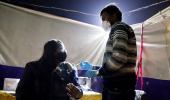As many as 300 districts in India are reporting weekly COVID case positivity of more than five per cent, the Union government said on Wednesday as it warned against treating the infection due to the Omicron variant as common cold and urged people to get vaccinated.

At a press conference, joint secretary in the Union health ministry Lav Agarwal said Maharashtra, West Bengal, Delhi, Tamil Nadu, Karnataka, Uttar Pradesh, Kerala and Gujarat are emerging as states of concern due to the rise in Covid cases there.
A sharp rise in COVID-19 infections has been noted in India with the case positivity climbing to 11.05 per cent on Wednesday from 1.1 per cent on December 30, he said.
Concurrently, Covid cases have been rising globally with January 10 recording the highest ever single-day rise of 31.59 lakh cases worldwide, Agarwal noted.
NITI Aayog member (health) VK Paul said the pandemic has again become intense, this time powered by the Omicron variant "which is rapidly replacing or has already replaced" Delta as the dominant form.
"Omicron is not the common cold and we cannot take it lightly just because it is causing mild infections. This variant has led to the collapse of the health system of some countries. Health workers at some places had to take leave leading to increased pressure."
Stressing that vaccination is an important pillar in the COVID response programme, Dr Paul said, "We need to be vigilant, get vaccinated and follow Covid-appropriate behaviour. It is society's responsibility to slow the spread... We will defeat this virus together."
About the spread of the disease, Agarwal said the number of districts reporting over five per cent weekly case positivity has increased from 78 in the week ending on January 4 to 300 in the week ending on Jan 11.
Informing the press conference that 19 states have over 10,000 active COVID cases, he said Mumbai, Pune and Thane in Maharashtra, Bengaluru Urban in Karnataka, Kolkata in West Bengal and Chennai in Tamil Nadu are emerging as districts of concern.
Stressing on the importance of getting inoculated, the joint secretary quoted the World Health Organisation to say that vaccine effectiveness against hospitalisation appears to be substantially higher than against symptomatic COVID-19 disease.
Paul said 92 per cent of India's adults have been administered the first dose of COVID-19 vaccine while 68 per cent are fully inoculated.
Around 18.86 lakh has been given precaution dose while 38 per cent of the adolescents in the age group of 15-18 years have received the first dose.
"It is our appeal, whoever is eligible should take the vaccine and those aged over 60 years must take the precaution dose," Paul said.
He said that some senior citizens are yet to get their first dose of vaccine.
"We estimate that of 13.75 crore (elderly) individuals, 12.25 crore got the first dose. We want those who have been left behind to get vaccinated. Their vulnerability is a concern for us," the NITI Aayog member said.
Paul said it was expected that the west to east progression of COVID-19 this time would take longer.
"But the spread has been rapid because of increased transmissibility of this new variant of concern."
"Now, we are understanding the disease from the Indian experience also. It looks like hospitalisation rates may be low but it is still large in scale. We have to maintain our vigil," he said.
Stating that genome sequencing of all COVID positive samples is not possible, Paul said, "Data from metro cities 10 days back showed 80 per cent cases were because of Omicron. But we can't say that Delta is not there. There is a mixed picture... it will also change."
On vaccination status of those dying from COVID-19, Agarwal said, "For people who take vaccines, their overall hospitalisation, death and (infection) severity reduces. We have not analysed that data from a clear detailed perspective. These have been mostly done as sample study."
Paul added that information is being collected and analysis will be done.
Asked about the impact of election rallies on the spread of the disease, Agarwal said, "The Election Commission has issued guidelines related to gathering and rallies. We are coordinating with the EC and a decision will be taken accordingly as the situation evolves."
India added 1,94,720 new infections to its tally of COVID-19 cases pushing it to 3,60,70,510, according to the Union Health Ministry data on Wednesday.
Active cases have increased to 9,55,319, the highest in 211 days, while the death toll has climbed to 4,84,655 with 442 fresh fatalities. Of the total 4,868 cases of the Omicron variant, 1,805 people have recovered or migrated so far.











 © 2025
© 2025